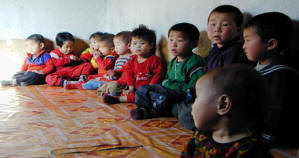 |
|
|
|
| DEPARTMENTS | |||
|
|
|||
|
|
|||
|
|
|||
|
|
|||
|
|
|||
|
|
|||
|
|
|||
| YOU CAN!... | |||
|
|
|||
|
|
|||
|
MORE ABOUT HUNGER NOTES |
|||
|
|
|||
|
|
|||
|
|
|||
|
|
|||
|
|
|||
|
|
Harmful economic systems: Impact on poor people and development
The impact on poor people of harmful economic systems has been enormous including control of income and resources by elites over centuries. Hundreds of millions confront starvation, while those who "govern" and "own" live very well.
Elites, in control of the government, have directed resources toward themselves, and not towards the poor.

Corruption has diverted funds from already under-funded health facilities. Photo: Laura Lopez Gonzalez/IRIN
Government corruption “cripples” Malawi's health sector IRIN News October 24, 2013
In Africa, corruption dirties the water Kenneth Odiwuor IRIN News March 14, 2013
Kickbacks, graft and tax evasion found sapping billions from Africa Patrick McGroarty Wall Street Journal March 12, 2013
The feminization of farming Oliver de Schutter New York Times March 3, 2013

A security guard standing at the entrance of a Mercedes Benz dealer in Islamabad. Photo: Kuni Takahashi/New York Times
Controlling the government, Pakistan’s elite pay few taxes, widening the vast gap between rich and poor, hindering development, and creating conditions that have sparked insurgency Sabrina Tavernise New York Times July 18, 2010

Many North Koreans lack food and basic medical care, a report by Amnesty International said this week Photo:Gerald Bourke/AP
North Korea's giant leap backwards: Last year's disastrous currency reform wiped out savings and caused healthcare to collapse--now many fear another famine Barbara Demick The Guardian July 17, 2010
Millions in Kenya free primary education funds appear to have been stolen--World Bank, British government suspend funding Afrique en ligne December 19, 2009
25 years after Live Aid, Ethiopia tries to cover up a new famine Times Online November 18, 2009 Also see Ethiopian government inaction, repression, and obfuscation is a major cause of the developing Ethiopian famine (opinion) Alemayehu G. Mariam Huffington Post November 25, 2009 See Hunger Notes special report: Harmful economic systems
The real hunger crisis--persistent poverty in rural Africa and South Asia Robert Paarlberg Foreign Affairs May 24, 2009
Tanzania's ruling elite neglect agriculture and poor farmers Ng’wanza Kamata University of Dar es Salaam May 24, 2009
Conflict and violence Conflict/war, caused by armed groups seeking to control the government, or territory or resources, has devastated vast regions of the world, and more importantly, vast numbers of the people of the world. Many people live lives of greatly diminished productivity (and happiness) due to conflict! Countries which have had major conflict in the last 40 years include Iraq, Afghanistan, Syria, Sudan, Somalia, the Democratic Republic of the Congo, Angola, Mozambique, Liberia, Rwanda, Burundi, Sri Lanka, Peru, El Salvador, Guatemala, Northern Uganda, and Colombia--to name just some.
War denying millions of children an education. Almost 50 million children and young people in conflict areas out of school, says report, with Syrian civil war worsening problem Mark Tran The Guardian July 11, 2013

Youth in Kenya’s Kibera slums carry crude weapons ready to fight youths from the rival side. Three people were killed in the January 2008 confrontation Photo: Julius Mwelu/IRIN
The price of fear: In slums where killings, rape, kidnappings and other criminal violence are commonplace, say researchers, lives and livelihoods are hampered by a force that is tough to measure—fear IRIN News May 15, 2013 Humanitarian intervention in violence-hit slums—from whether to how IRIN News May 15, 2013
Fifteen years of conflicts have cost Africa around $300 billion--equal to the amount of international aid received Oxfam International October 12, 2007 See the full Oxfam study
As Syrian refugee population nears 1 million, relief agencies cannot keep up Taylor Luck Washington Post March 4, 2013
Armed Conflicts Now the Leading Cause of Hunger Emergencies, FAO Says (May 23, 2005) See also the excellent earlier study by Messer, Cohen and D'Costa Armed Conflict and Hunger.
Continued oppression and deprivation over centuries/Great income inequality
The past five centuries or so have seen considerable hardship for the people living in many (now often past) societies. Africans may be taken as a key example
The people of Africa--Sub-Saharan Africa-- have been injured greatly by the operation of the world economic/political system. This can be divided into three parts, slavery, "classical" imperialism, and the modern world.
Slavery. How many slaves were taken from Africa? What kind of social system--in Africa and in the world--permitted them to be taken? (Under what circumstances would you give your daughter or son up to slavery And if the answer is never--what circumstances would make your answer irrelevant?) Slavery and the accompanying social system imposed on Africa began in the 1600s and continued until the late 19th century and, to some extent, even today.
Imperialism. In addition of course to slavery there was a dividing up of the whole continent by England, France, Belgium, Spain, Portugal and Germany. Why should this be allowed! Well of course it was, due to superior arms and organization, not to mention control of the relevant international organizations which "sanctioned" such things. So the people of the continent spent 100 plus years benefiting these developed nations through such means as exporting resources--gold, diamonds, and metals.
Dispossessing Africa's Wealth Patrick Bond November 24, 2005
The question as to who and what is responsible for African underdevelopment can be answered at two levels. Firstly, the answer is that the operation of the imperialist system bears major responsibility for African economic retardation by draining African wealth and by making it impossible to develop more rapidly the resources of the continent."Contemporary Africa For a discussion of how structures of harm have continued, see The influence of ideas and the power relationships that lead to those ideas on development in Africa Issa G. Shivji Pambazuka News October 22, 2005
Barriers to entry (racism, ethnic groupings, discrimination...)
How social networks drive black unemployment Nancy DiTomaso New York Times May 5, 2013
The positive economics of 'leaning in'—economists estimate that that between 1960 and 2008, about 15% to 20% of the growth in productivity, or output per hour of work, came from removing the barriers that blocked many white women and blacks of both genders from realizing their potential David Wessell Wall Street Journal April 3, 2013